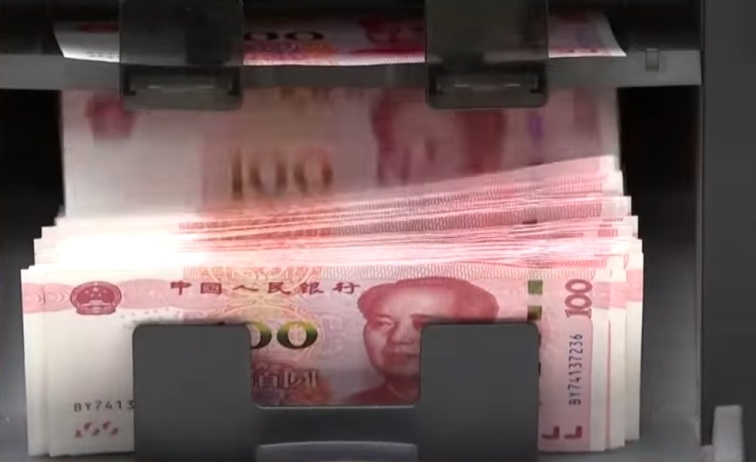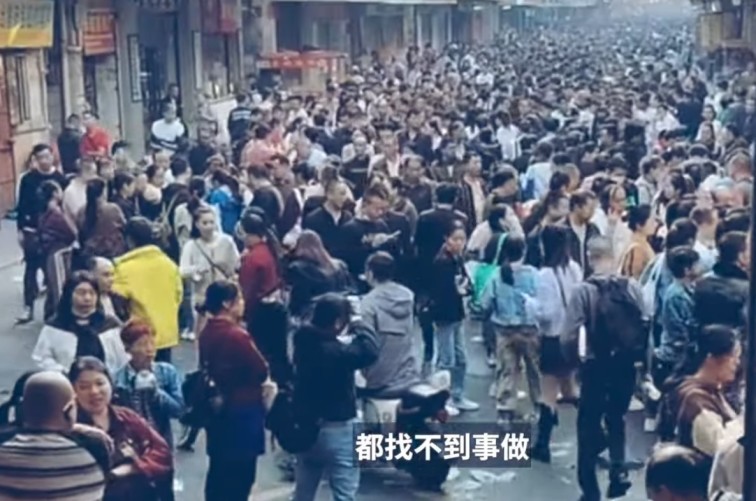On January 6, 2025, at the plenary session of the Chinese Communist Party's (CCP) Central Commission for Discipline Inspection, Xi Jinping stated: "The stockpile of corruption has not yet been eradicated, and new cases continue to emerge..." indirectly admitting the failure of the anti-corruption campaign. (Video screenshot)
[People News] A widely shared online image employs sarcastic language to illustrate the various methods by which corrupt officials in the Chinese Communist Party (CCP) "quietly collect money", capturing public attention. This image categorises corrupt practices into three tiers: 'low, medium, and high,' showcasing the progression from red envelope kickbacks to overseas capital operations, and emphasising the structural characteristics of power rent-seeking across different ranks within the CCP. Insiders reveal that the bribery techniques in the officialdom have become so concealed that they are difficult for the Central Commission for Discipline Inspection (CCDI) to investigate.
As reported by Radio Free Asia, an image titled 'How Corrupt Officials Quietly Collect Money' has quickly circulated in WeChat groups on social media. The image summarises common 'hidden financial flows' within the CCP's corruption ecosystem in a structured format resembling 'experience summaries.' While the language is overtly sarcastic, the scenarios depicted reflect a chilling reality.
In the so-called 'low-level' methods of collecting money, corrupt officials typically engage in power-money transactions through traditional means such as kickbacks, cash gifts, precious metal transfers, group purchase cards, and tea gift boxes. Although these methods may lack sophistication, they are widely used due to their strong concealment and frequent execution.
Grassroots officials, having less power, are relatively 'clean' compared to those who give gifts.
During an interview with Radio Free Asia this Thursday (8th), Mr. Zhen from Shanghai remarked that grassroots officials possess limited power, and the level of bribery among them is not as severe as that of high-ranking officials: 'The less power grassroots cadres have, the fewer gifts they receive. Typically, gifts are given to those in positions of greater authority. For instance, if you want to secure a good job, such as in the neighbourhood committee, you need to present gifts to the leaders when you want to park your car. If you're aiming for a promotion, giving gifts is a must. This also applies in the military; to become a squad leader, you need to give gifts, and to be a platoon leader, the amount increases. The higher the rank, the more expensive the gifts, whether in cash or in kind.'
The methods of receiving money categorised as 'lower-level' include cash red envelopes, bidding kickbacks, shopping cards, and others listed in the figure, which are the most frequently reported corruption practices by the discipline inspection commission. For example, Li Xinghua, the former vice chairman of the CPPCC in Ganzi Prefecture, Sichuan Province, was found to have accepted supermarket cards, shopping cards, premium tea, and renowned liquor from business owners. Most of these gifts were exchanged during holiday visits or through collective procurement by organisations, making them both discreet and commonplace.
The mention of 'tea gift shops' in the figure brings to mind a report by the Chinese Communist Party's official media regarding the case of Qin Guangrong, the former secretary of the Yunnan Provincial Committee. Qin had long-standing close ties with local wealthy businessmen and frequently accepted substantial gifts disguised as 'tea' and 'collectables,' with increasingly elaborate packaging, amounting to millions.
The practice of mid-level officials accepting gifts has become 'legitimised.'
At the 'middle level', corruption tactics are often linked to educational resources and equity interests. For instance, scholarships may be established under the guise of facilitating the admission of officials' children to prestigious schools, or shares may be allocated to specific relatives prior to a company's public listing, allowing them to cash out during a period of inflated valuations. These actions tend to emphasise a 'legal' appearance, while fundamentally exploiting policy advantages or insider information for personal gain. A case in point is Cao Guangjing, the former vice governor of Hubei Province, who was dismissed in 2022; his son held shares in a local energy company that later experienced rapid growth supported by local policies.
In this context, Mr. Zhen, who chose to remain anonymous, remarked: 'High-ranking officials can receive gifts through law firms, charging consultation fees and service fees, which effectively serves as a disguised method of accepting gifts.'
Another notable case is that of Liu Tienan, the former deputy director of the National Development and Reform Commission, who was sentenced to life imprisonment. His son, Liu Decheng, held directorships in several companies that profited significantly from various energy approvals, leading to widespread scepticism regarding his 'identity convenience' background. Allegations of 'scholarship admissions' and 'property gifts' frequently arise during the trials of various officials, such as registering overseas properties in others' names to circumvent property declaration requirements. The prosecution claimed that Liu Tienan accepted money, cars, and other items from others during his tenure in relevant positions, with the total value of the case exceeding 35 million yuan.
Li Fanglin, a long-term social observer in Guangdong, informed reporters that the methods of gift-giving within the Chinese Communist Party (CCP) bureaucracy are diverse, encompassing various levels such as grassroots, middle, high, and even 'outer layers.' He stated, 'The so-called wisdom of the Chinese in gift-giving includes some paths that are invisible and intangible, yet ultimately achieve their objectives. The CCP system operates as a reverse elimination system; it is not merely about officials accepting bribes. Accepting bribes is just a material aspect; the official wants you to grasp his true intentions internally, while ensuring that outsiders cannot perceive it. It is about making you (the official) aware that I am aligned with you, and it is certainly not about the amount of money given, but rather about providing people and resources.'
Particularly noteworthy is the description in the 'high-level' section. The figure illustrates that certain senior elites have engaged in money laundering, cashing out, and tax evasion through mechanisms such as offshore shell companies, offshore accounts, and art auctions. For instance, they invest in film and television projects, manipulate virtual currencies, frequently visit Macau casinos, and even utilise Qing Dynasty porcelain auctions to facilitate cross-border asset transfers. The complexity of these operations is far beyond what standard disciplinary inspection methods can easily uncover.
Corruption among high-ranking officials is even more concealed, presenting significant challenges for the Central Commission for Discipline Inspection in their investigations.
Mr. Peng (Peng Xiansheng), a former real estate professional from Hubei Province, revealed to our station the 'outer layer' of corruption, noting that even the Central Commission for Discipline Inspection of the Communist Party of China struggles to find evidence of corruption among high-ranking officials in a short time. He explained that these officials have ceased to accept cash and valuables; even during meals, it is the officials who personally settle the bills: 'They do not take your money or your properties, nor do they accept any gifts. However, after you retire (in over a decade), there will be assets transferred from a proxy to your name, drawn from your relatives' names to yours. He does not take your money, and you (outsiders) cannot see him receiving properties or other bribes; he wants nothing. The proxies managing assets around him may not necessarily be his relatives, but they are individuals he trusts deeply, making it impossible to investigate. When I dine with senior leaders in the financial sector, they do not even want you to pay the bill; they take care of it themselves. He says, 'I will pay the bill,' and he insists that it is better for him to do so.'
Mr. Peng mentioned that while this online image cannot be used as legal evidence, it holds significant social observational value. It illustrates the 'evolutionary path' of corruption from crude to sophisticated, from grassroots to financial, and highlights how institutional loopholes are continuously exploited by 'technological corruption.'











News magazine bootstrap themes!
I like this themes, fast loading and look profesional
Thank you Carlos!
You're welcome!
Please support me with give positive rating!
Yes Sure!